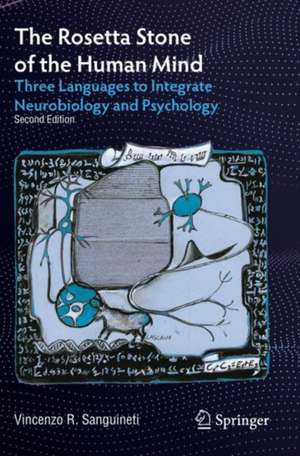The Rosetta Stone of the Human Mind: Three Languages to Integrate Neurobiology and Psychology
Autor Vincenzo R. Sanguinetien Limba Engleză Paperback – apr 2023
| Toate formatele și edițiile | Preț | Express |
|---|---|---|
| Paperback (1) | 247.54 lei 3-5 săpt. | +35.60 lei 6-12 zile |
| Springer International Publishing – apr 2023 | 247.54 lei 3-5 săpt. | +35.60 lei 6-12 zile |
| Hardback (1) | 254.66 lei 3-5 săpt. | |
| Springer International Publishing – 31 mar 2022 | 254.66 lei 3-5 săpt. |
Preț: 247.54 lei
Nou
Puncte Express: 371
Preț estimativ în valută:
47.37€ • 50.65$ • 39.49£
47.37€ • 50.65$ • 39.49£
Carte disponibilă
Livrare economică 27 martie-10 aprilie
Livrare express 12-18 martie pentru 45.59 lei
Preluare comenzi: 021 569.72.76
Specificații
ISBN-13: 9783030864170
ISBN-10: 3030864170
Pagini: 167
Ilustrații: XXII, 167 p. 25 illus., 6 illus. in color.
Dimensiuni: 155 x 235 x 20 mm
Greutate: 0.3 kg
Ediția:2nd ed. 2022
Editura: Springer International Publishing
Colecția Springer
Locul publicării:Cham, Switzerland
ISBN-10: 3030864170
Pagini: 167
Ilustrații: XXII, 167 p. 25 illus., 6 illus. in color.
Dimensiuni: 155 x 235 x 20 mm
Greutate: 0.3 kg
Ediția:2nd ed. 2022
Editura: Springer International Publishing
Colecția Springer
Locul publicării:Cham, Switzerland
Cuprins
Learning the Languages.- Humanity’s Search for Mind and the Subject: A Brief Review of the Evolution of Neuropsychobiology.- An “Ideographic,” Suprapersonal Language of Rules and Universal Symbols: Alwyn Scott and Nonlinear Dynamics.- A “Demotic,” First-Person Language of the Individual and the Social System: Apuleius and the Myth of Psyche.- The Language of the Objective Observer: Gerald Edelman and Neurodarwinism: Antonio Damasio and the Feeling of Knowing.- Seeking the Understanding.- Consciousness.- The Unconscious.- The Database.- Affectivity.- The Neural/Mental Gap: Intuition, Self and Ego, a Trilingual Map.- Applying the Knowledge.- The Three Languages and Science: A New Scientific Paradigm?.- The Three Languages and Treatment.- The Psychotherapeutic Dialogue: Intersubjectivity.- The Role of a New Science for Psyche Upon Society and Culture.
Notă biografică
Vincenzo Sanguineti was born in Eritrea and lived there until completion of Medical School at the “Universita’ Degli Studi” in Milan, Italy. He then spent five years in Nigeria, where he conducted published field research in Tropical Medicine and directed a missionary hospital. Consequently, he profited from the prolonged exposure to uncontaminated natural habitats and to the degrees of difference and similarity among different species, and different human cultures, which enhanced his fascination for the interaction between the unique subjectivity of the self and the interactive processes stemming from the profound complexity of the individual and collective variables participating to the phase-space of the mind. Such interests evolved into more programmatic research that generated various studies and formed the basis of his books: “Landscapes in my Mind,” “The Rosetta Stone of the Human Mind,” and his fictional historical biography of Sarpedon, the mythical king of Lykia. Currently, Dr. Sanguineti is in private practice in Philadelphia, where he is Associate Professor in the Department of Psychiatry at Jefferson Medical Center, within the Sidney Kimmel Medical College.
Textul de pe ultima copertă
The study of the brain-mind complex has been hampered by the dichotomy between objective biological neuroscience and subjective psychological science. The two antithetical avenues of research are partly responsible for the failure to unravel the transformation of neural events into mental images: how matter becomes imagination, and vice versa; is the brain’s consciousness equivalent to Ego consciousness? Is the ego the self? In its new and updated edition, “The Rosetta Stone of the Human Mind: Three Languages to Integrate Neurobiology and Psychology” illustrates how the simultaneous use of the languages of neurobiology, of mathematics, and of the humanities, enriches the understanding of the neural and mental realms and adds new dimensions to our perception of neuropsychological events. Dr. Sanguineti shows how the two seemingly dichotomous approaches are similar in what they describe, and he explores how the awareness and application of these perspectivesare helpful in getting a deeper theoretical grasp on major mental events, giving us a better understanding of individual minds, and fostering a more integrated therapeutic intervention. The intended readers include neuroscientists, psychiatrists, psychologists, and anyone interested in the human mind.
Describes a model integrating biological neuroscience principles, subjective psychological science, and nonlinear physics and mathematics
Offers a wide-ranging, holistic exploration of the mind and its conscious and unconscious realms, using myth, art, philosophy, neurobiology and basic sciences
Introduces the future new paradigm for emergent science, the Poem, to replace the outdated classical reductionistic paradigm of the Machine
Describes a model integrating biological neuroscience principles, subjective psychological science, and nonlinear physics and mathematics
Offers a wide-ranging, holistic exploration of the mind and its conscious and unconscious realms, using myth, art, philosophy, neurobiology and basic sciences
Introduces the future new paradigm for emergent science, the Poem, to replace the outdated classical reductionistic paradigm of the Machine
Caracteristici
Describes a model integrating biological neuroscience principles Offers a wide-ranging, holistic exploration of the mind and its conscious and unconscious realms Introduces the future new paradigm for emergent science
